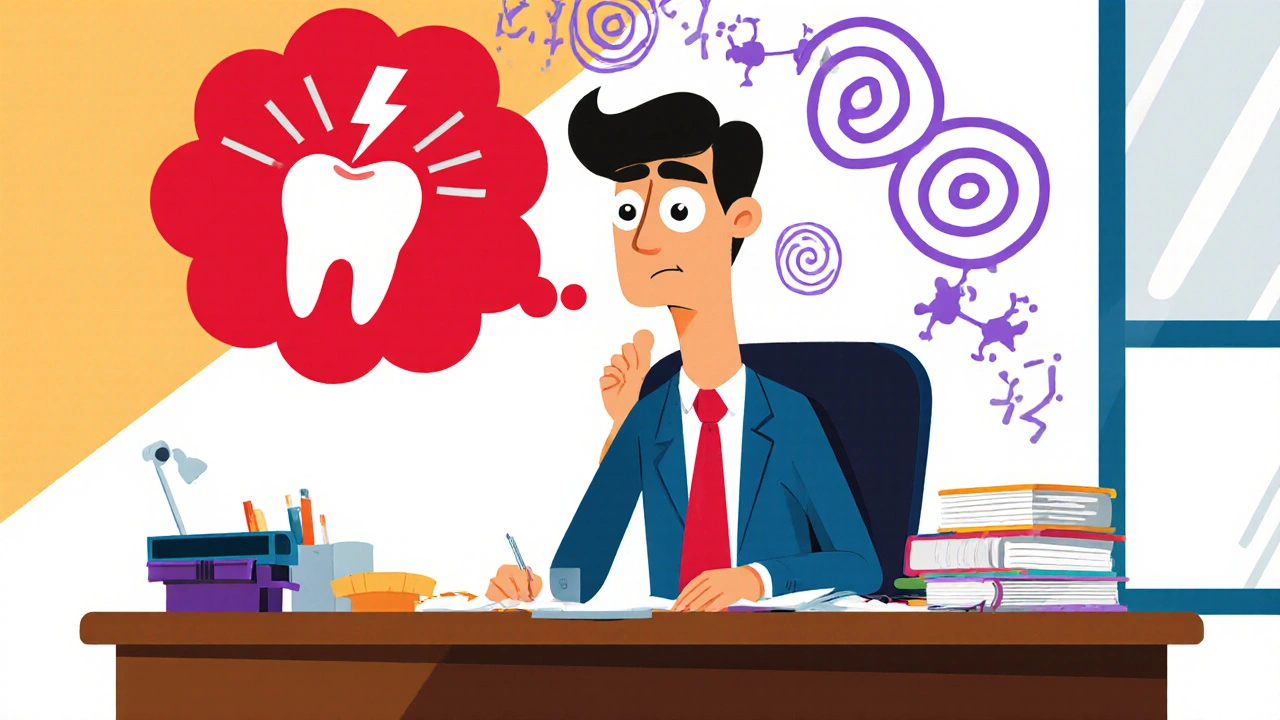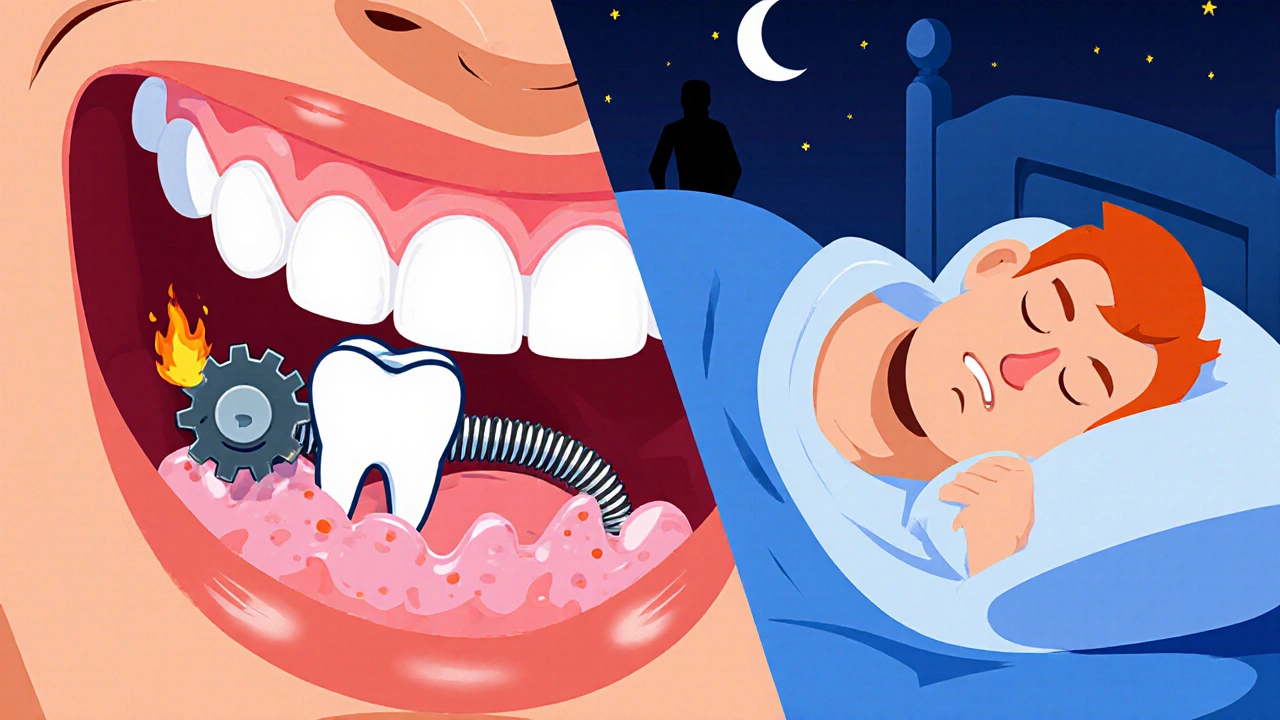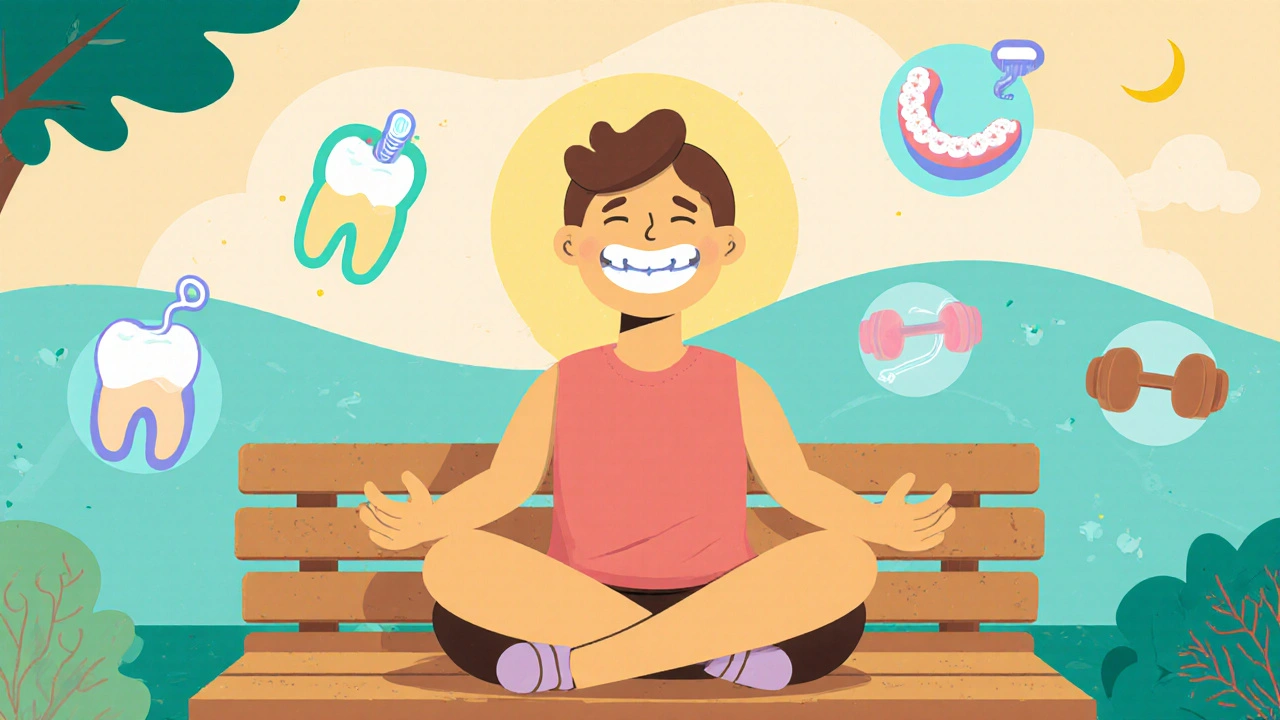
Stress-tooth Symptom Checker
Check Your Symptoms
Answer these 5 questions to determine if your tooth pain might be stress-related.
Ever notice a pounding headache after a stressful day, only to find a sharp pain throbbing in a molar? You’re not imagining it-your emotions can actually set off a toothache. This article breaks down why stress and dental pain are tangled, what warning signs to watch for, and practical steps to keep both your mind and mouth feeling good.
Stress: More Than a Mental State
When you feel anxious or overwhelmed, your body launches a cascade of hormones-primarily adrenaline and cortisol. Cortisol is a glucocorticoid that helps regulate blood sugar, inflammation, and metabolism during "fight‑or‑flight" responses. While short bursts can be useful, chronic elevation wears down tissues, raises blood pressure, and disrupts normal immune function. The result? Muscles stay tense, blood vessels constrict, and pain thresholds lower, paving the way for discomfort in places you might not expect-like your teeth.
How Stress Travels to Your Teeth
The mouth is a nerve‑rich environment, and several pathways let stress‑related signals reach dental structures:
- Muscle tension: Stress tightens the jaw muscles, increasing pressure on the temporomandibular joint (TMJ) and surrounding teeth.
- Immune suppression: Elevated cortisol can weaken the gums' ability to fight bacterial invasion, accelerating gum disease.
- Behavioral changes: Stressed people often neglect oral hygiene, snack on sugary foods, or grind their teeth-each a direct trigger for pain.
Stress‑Related Dental Conditions
Here are the most common oral issues that pop up when stress is the hidden culprit:
Bruxism (teeth grinding) is an unconscious clenching habit that peaks during sleep or intense concentration. The constant friction wears enamel, exposes dentin, and can cause sensitivity that feels like a sudden toothache.
Gum disease (periodontitis) thrives when immune defenses drop. Inflamed gums retract, exposing tooth roots that are far more sensitive to temperature and pressure.
Temporomandibular joint disorder (TMJ) arises from chronic jaw muscle strain. Pain radiates from the joint to the ear, cheek, and even the front teeth, often misidentified as a simple toothache.
Other stress‑linked problems include increased risk of dental infections, delayed healing after dental work, and heightened perception of existing pain.

Spotting the Stress‑tooth Connection
Not every ache means you need a root canal. Look for these clues that point to stress as the trigger:
- Pain appears during or after high‑pressure events (deadlines, exams, arguments).
- Symptoms are bilateral (both sides of the mouth) rather than localized to one tooth.
- Jaw muscle tenderness or clicking when opening the mouth.
- Morning headaches coupled with sore teeth-often a sign of nighttime bruxism.
- Recent changes in oral hygiene habits, diet, or sleep patterns.
Managing Stress to Protect Your Smile
Taking control of stress not only steadies your mind, it also shields your teeth. Try these evidence‑backed tactics:
- Progressive muscle relaxation: Systematically tense and release facial and jaw muscles for 5‑10 minutes each evening.
- Mindfulness meditation: Daily 10‑minute sessions lower cortisol and improve pain tolerance.
- Limit caffeine and alcohol: Both can increase muscle tension and worsen bruxism.
- Maintain a strict oral‑care routine: Brush twice, floss daily, and use an antimicrobial mouthwash to keep gum disease at bay.
- Use a night‑guard: A custom-fitted appliance cushions the teeth, reducing grinding wear.
- Physical activity: Regular exercise boosts endorphins, which counteract stress hormones.

When to See a Dentist
If you’ve tried stress‑relief tricks but the pain persists, it’s time to book an appointment. Seek professional help when you notice:
- Persistent throbbing that lasts more than 48 hours.
- Swelling, pus, or unusual discoloration around a tooth.
- Difficulty chewing or a “locked” jaw that won’t open fully.
- Recurring headaches that don’t improve with over‑the‑counter meds.
Dental professionals can rule out cavities, identify cracks, and provide targeted treatments like fluoride varnish, scaling, or splint therapy for TMJ.
Quick Stress‑tooth Checklist
- Do you feel more jaw tension during stressful periods?
- Are you grinding or clenching, especially at night?
- Is your oral hygiene routine consistent?
- Have you noticed gum redness or bleeding?
- Do you experience headaches that coincide with tooth pain?
Answering “yes” to two or more items suggests a stress‑related dental issue. Use the strategies above, and schedule a dental check‑up if the pain sticks around.
Frequently Asked Questions
Can stress cause a cavity?
Stress itself doesn’t create decay, but it can lead to habits-like sugary snacking or reduced brushing-that increase cavity risk.
Is a night‑guard necessary for everyone with stress‑related tooth pain?
If you grind or clench regularly, a night‑guard protects tooth surfaces and eases jaw muscle strain. For occasional tension, relaxation exercises may suffice.
How quickly can stress‑triggered gum disease develop?
Chronic stress can accelerate gum inflammation within weeks, especially if oral hygiene lapses. Early signs include redness, swelling, and bleeding on flossing.
Are there fast‑acting home remedies for a stress‑related toothache?
Warm compresses on the jaw, OTC anti‑inflammatory gels, and gentle jaw stretches can reduce tension. Combine these with stress‑relief techniques for best results.
Should I medicate my stress to stop dental pain?
Consult a healthcare provider before starting any medication. Often, lifestyle changes and behavioral therapy are enough to lower stress hormones without drugs.

Annie Crumbaugh
October 15, 2025 AT 21:54Stress really does make my jaw feel tight.
Vic Harry
October 24, 2025 AT 00:33Stop ignoring the fact that stress is making you grind your teeth you need to get a night guard now
Suman Wagle
November 1, 2025 AT 02:11Oh, so now my molars are joining the anxiety club? Sure, why not, let's add a little drama to my dinner. Stress is the new floss, apparently. If you think about it, your jaw is just a tiny, overworked drummer in the body’s rock band. So when life gets loud, the drums start pounding on your teeth.
Neil Sheppeck
November 9, 2025 AT 04:50Wow, the link between cortisol spikes and that dreaded night‑time grind is fascinating! I’ve started doing a quick jaw stretch before bed and honestly, my mornings feel less like a construction site. Also, swapping sugary midnight snacks for a piece of cheese helps my gums stay happy. Keep the good vibes coming, folks.
Bradley Fenton
November 17, 2025 AT 07:28Tell your dentist about your stress levels, they might suggest a night‑guard.
Wayne Corlis
November 25, 2025 AT 10:07Let’s dive deep into the absurdity of how our modern lives have turned the humble tooth into a barometer of existential dread.
First, we all know stress pumps cortisol into our bloodstream like a faulty sprinkler, drenching every tissue, including the delicate pulp inside the tooth.
Second, that relentless tension in the jaw muscles is not just a subtle inconvenience; it’s a full‑blown siege that presses the temporomandibular joint into a state of perpetual complaint.
Third, when you’re stressed, you’re more likely to skip flossing, swear off vegetables, and reach for that candy bar, giving the bacteria a free‑for‑all buffet.
Fourth, the combination of hormonal chaos and bacterial overgrowth creates the perfect storm for gum inflammation, exposing the roots of your teeth to temperature assaults.
Fifth, let’s not forget bruxism – the nocturnal grind that turns your molars into marble statues, eroding enamel layer by relentless layer.
Sixth, each microscopic crack from grinding sends pain signals straight to the brain, amplifying the perception of stress‑induced discomfort.
Seventh, the feedback loop is cruel: pain raises stress, stress raises pain, and you’re stuck in a maddening carousel.
Eighth, the sympathetic nervous system, already on high alert, amplifies the pain pathways, making even a tiny ache feel like a jackhammer.
Ninth, chronic stress also suppresses the immune response, making gum disease progress faster than it would in a relaxed state.
Tenth, the vascular changes from cortisol reduce blood flow to the gums, impairing healing after any dental work.
Eleventh, the oral microbiome shifts under stress, favoring pathogenic species that thrive in low‑pH environments.
Twelfth, you might notice morning headaches that coincide with jaw soreness – a classic sign that your muscles have been doing overtime while you were dreaming.
Thirteenth, mindfulness and progressive muscle relaxation can actually lower the cortisol surge, giving your jaw a chance to unwind.
Fourteenth, a custom‑fitted night‑guard acts as a physical barrier, preventing the grinding forces from transmitting to the teeth.
Fifteenth, if the pain persists despite these measures, it’s a signal to see a dentist for a proper assessment, because sometimes the underlying issue is a cracked tooth or an infection that stress alone can’t hide.
In short, stress doesn’t just live in your mind; it haunts your mouth, and the best defense is a blend of stress‑management, good oral hygiene, and professional care.
Kartikeya Prasad
December 3, 2025 AT 12:45Whoa, that was a marathon of dental philosophy 😅. You really went all‑in on the 15‑sentence marathon, didn’t you? Guess I’ll have to bookmark this for when I need a bedtime story about molars. And yes, a night‑guard is basically a tiny superhero cape for your teeth.
Jefferson Vine
December 11, 2025 AT 15:24Everyone needs to know that the dental industry is hiding the real cure for stress‑induced tooth pain. It’s not the night‑guards or the herbal teas they push. There’s a secret protocol that big pharma doesn’t want you to discover.
Ben Wyatt
December 19, 2025 AT 18:02Hey folks, remember that even small steps like a short walk or a few deep breaths can lower cortisol and give your gums a break. Keep it simple and stay positive!
Donna Oberg
December 27, 2025 AT 20:41Oh my goodness!!! I cannot believe how many people ignore the simple fact that stress is a silent assassin for our smiles!!! Let’s all take a moment to thank our dentists for being the unsung heroes!!!
Garreth Collard
January 4, 2026 AT 23:19Honestly, the drama of a swollen gum is like watching a tragic opera – you can’t look away, but you wish the curtain would close sooner.
Daniel LaMontagne
January 13, 2026 AT 01:58😊 Totally feel you, Donna! Stress really does turn our mouths into a battlefield. A quick jaw massage and some calming music can work wonders. Keep smiling! 😁
Gary Levy
January 21, 2026 AT 04:37Interesting points all around – I’d add that staying hydrated helps keep saliva flowing, which naturally cleans the teeth and reduces inflammation.
sourabh kumar
January 29, 2026 AT 07:15Stress is just a myth the media uses to sell anxiety pills dont believe the hype
Christian Miller
February 6, 2026 AT 09:54While conventional wisdom links cortisol to dental issues, some argue that undisclosed pharmaceutical trials have manipulated data to obscure alternative therapies. It is prudent to question the sources of such information.